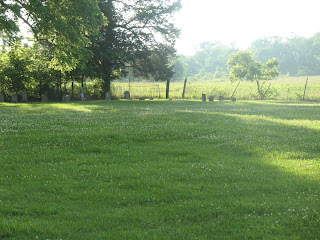

The
cemetery at Shaker Village in Whitewater Township is located on Oxford road,
near Miami Whitewater Park. The village was founded in 1824, and I was unable
to find out when the cemetery itself was founded, but I imagine it was close to
that time.
Between
1787 and 1824 the United Society of Believers in Christ's Second Appearing,
more commonly known as “Shakers” (due to the dancing found in a traditional
service), founded 24 communal villages.
Members of the Shakers from Lebanon, OH, came to share their religion
with a group of settlers. The rich soil they discovered, along with the possibilities
Whitewater River provided, led them to settle here.
The Shakers
were communal. A large portion of their religion was celibacy, and they did not
practice marriage. Instead, they lived in non-related “families”. Each family
lived in a large house, with separate entrances for men and women. These houses were often named by their
direction from the leading group, called the Church house. Then there would be
the North house, the South house, and so on. Each house was self-sufficient,
with its own farm and businesses.
Women
and men were separate, but equal. Even in the church, the women were allowed to
hold positions of power.
The Shakers
did not practice procreation themselves. Children entered the religion either
through the conversion of their parents (whose marriage was dissolved upon
conversion), or by the adopting of orphans.
The Shaker
religion faded after the Civil War. The world became more liberal, and people
were not interested. With no children being born into the religion, it essentially
died out.
Whitewater
was sold by the Canterbury Ministry, the “parent” Shaker organization, in 1916.
The last two shakers departed.
The
layout of the cemetery is strange. While the property isn’t large, only
around ¼ of the land has any type of markers on it. The first half of the
cemetery is just grass. About halfway back, there is a large granite memorial
placed by the Canterbury Ministry in remembrance of all the Shakers that lived
and died there. There are two smaller headstones on either side. From there, it
seems they grouped people at the two back corners, and were moving inward. It
may be, due to the Shaker idea of men and women being separate, that men are in
one corner, and the women in the other. From what I observed, this could be the
case. I did observe “mother” in one portion, and “father” in the other. However, given the shape of the cemetery, I
don’t know if there are more buried there than there are markers for, and
therefore what I observed is not what was intended.
 |
| View from the Front of the Cemetery |
 |
| Close up of memorial |
 |
| Looking Right |
 |
| Looking Left |
 |
| From the right, looking center |
The
cemetery at Shaker Village was neglected, until two individuals restored it in
1984. The Crosby Township trustees are now responsible for maintaining it.
The trustees are not doing a very good job.
Although the grass is cut, the cemetery is in bad shape. The headstones are
falling over, cracked, and sunk into the ground. Some of them, I couldn’t even
tell if the headstones were just incredibly worn, or if anything was written on
them in the first place. There is very little iconography, or monuments. In fact,
I only saw three of what I would consider monuments; two scrolls and a tiny pillar
with a wreath on it. For the most part, all of the memorials looked like your
typical headstones. This may be due to the Shaker belief that all are equal.
 |
| Small Monument |
 |
| Scroll |
There
were a few things I found unusual, especially when compared to your typical cemetery.
A few headstones that I could make out had “Mother” or “Father” on them. This
is interesting, as the Shakers would not have your typical “Mother” or “Father”. One Headstone seemed to have been broken, but
was poorly reconstructed out of cement. A couple headstones only had initials
on them. Some do not appear to be worn, but there is nothing on them. Lastly,
there is only one child memorialized.
 |
| "Mother" inscribed on the top of headstone |
 |
| Child Headstone |
 |
| Reconstructed Headstone |
Gladstone
and Strauch would not have wanted to spend time in this cemetery. I imagine it
is due to cemeteries that appeared as this one did that Spring Grove was built,
and meticulously landscaped.
The Shaker
Cemetery reminded me more of a rock garden than a cemetery. It was interesting to
explore, simply due to the disrepair. On the other hand, I was a little
disappointed. I was looking forward to reading headstones, and trying to decipher
the Shaker heritage. However, due to the condition of the cemetery, this was
impossible.
 |
 |
| Showing the general condition of the Cemetery |






Rock Garden is a much nicer term than boneyard...
ReplyDelete